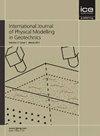粘土中椭圆形竖井开挖引起的地表沉降
IF 1.2
4区 工程技术
Q4 ENGINEERING, GEOLOGICAL
International Journal of Physical Modelling in Geotechnics
Pub Date : 2022-10-06
DOI:10.1680/jphmg.21.00080
引用次数: 0
摘要
竖井的建造通常是为了进入地下基础设施,由此产生的开挖通常又深又窄。根据地面条件和预期用途,可以使用各种方法和平面形式建造竖井。轴对称(圆柱形)几何形状通常是优选的,因为结构分析、施工方法相对简单,并且有许多方法可用于估计此类开挖周围的地面运动。在某些情况下,特别是当表面上方和下方都有受限空间时,非圆形轴可能是一种优选的解决方案。评估非圆形轴周围的表面运动是困难的,因为信息很少,而且可用的经验预测方法也很少。在这项研究中,进行了一系列离心机试验,以研究修改轴的横截面轮廓(即平面中的圆形与椭圆形相比)的影响。分析了在伦敦大学城市分校的岩土离心机设施进行的离心机测试中获得的测量结果,并与现有的预测方法进行了比较。提出了预测圆形竖井引起的表面沉降的经验方程和程序的附录,以便评估粘土中椭圆竖井周围的运动。本文章由计算机程序翻译,如有差异,请以英文原文为准。
Surface settlements arising from elliptical shaft excavation in clay
Shafts are frequently constructed to allow access to subsurface infrastructure and the resulting excavation generally deep and narrow. Shafts may be constructed using a variety of methods and plan forms dependent on ground conditions and intended use. An axisymmetric (cylindrical) geometry is often preferred due to the relatively simple structural analysis, construction method and for a number of approaches that are available to estimate the ground movements around such an excavation. In certain cases, particularly when there is restricted space both above and below surface, non-circular shafts could be a preferred solution. The assessment of surface movements around non-circular shafts is difficult as little information exists and there are few empirical prediction methods available. In this study, a series of centrifuge tests have been conducted to investigate the effects of modifying the cross-sectional profile of a shaft (i.e. circular in plan compared with elliptical). Analysis of measurements obtained from centrifuge tests undertaken at City, University of London's geotechnical centrifuge facility are presented and compared with existing predictive methods. An addendum to the empirical equations and procedures for predicting surface settlements arising from circular shafts is presented to allow for the assessment of movements around elliptical shafts in clay.
求助全文
通过发布文献求助,成功后即可免费获取论文全文。
去求助
来源期刊

International Journal of Physical Modelling in Geotechnics
ENGINEERING, GEOLOGICAL-
CiteScore
3.60
自引率
15.80%
发文量
26
期刊介绍:
International Journal of Physical Modelling in Geotechnics contains the latest research and analysis in all areas of physical modelling at any scale, including modelling at single gravity and at multiple gravities on a centrifuge, shaking table and pressure chamber testing and geoenvironmental experiments.
 求助内容:
求助内容: 应助结果提醒方式:
应助结果提醒方式:


